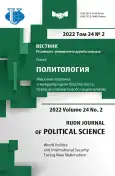The Main Electorate of Right-Wing Populist Parties in Europe: Cases of the Alternative for Germany and the Freedom Party of Austria
- Autores: Meshcheryakov D.Y.1
-
Afiliações:
- Moscow State Institute of International Relations (University) of the Ministry of Foreign Affairs of the Russian Federation
- Edição: Volume 24, Nº 2 (2022): World Politics and International Security Facing New Nationalism
- Páginas: 268-278
- Seção: CHALLENGES OF POPULISM AND CONSERVATIVE NATIONALISM
- URL: https://journal-vniispk.ru/2313-1438/article/view/322628
- DOI: https://doi.org/10.22363/2313-1438-2022-24-2-268-278
- ID: 322628
Citar
Texto integral
Resumo
There is an ongoing political debate on whether certain groups can be considered the electoral backbone of right-wing populist parties. On the one hand, it is argued that there is no concept of a “typical voter” for right-wing populists; on the other hand, some studies of election campaigns in different countries show that it is possible to define electoral support groups for such political parties based on the social, professional, and demographic characteristics. The cases of the “Alternative for Germany” and the “Austrian Freedom Party” analyzed in the article demonstrate that the latter statement is more likely to be true. Those support groups can be identified within the framework of the sociological theory of electoral behavior, as well as the theories of the losers of globalization by H. G. Betz and the cultural backlash of P. Norris and R. Inglehart, using the analysis of existing relevant statistics, mainly sociological surveys. The examples of Germany and Austria prove the assumptions that men, workers, people with no higher education and the unemployed are more likely to vote for right-wing populist parties.
Palavras-chave
Sobre autores
Dmitry Meshcheryakov
Moscow State Institute of International Relations (University) of the Ministry of Foreign Affairs of the Russian Federation
Autor responsável pela correspondência
Email: dmesh91@gmail.com
ORCID ID: 0000-0001-9745-4962
postgraduate at the Department of Comparative Politics
Moscow, Russian FederationBibliografia
- Arzheimer, K. (2017). Electoral sociology — who votes for the extreme right and why–and when? In C. Mudde (Ed.), The Populist Radical Right: A Reader (pp. 277–289). Abingdon, Oxon; New York: Routledge.
- Fallend, F., Habersack, F., & Heinisch, R. (2018). Rechtspopulismus in Österreich: Zur Entwicklung der FPÖ. Aus Politik und Zeitgeschichte, 68(34-35), 33–40. (In German).
- Giebler, H., & Regel, S. (2018). Who Votes Right-Wing Populist? Geographical and Individual Factors in Seven German State Elections. Friedrich-Ebert-Stiftung: WISO Diskurs.
- Givens, T. E. (2017). The radical right gender gap. In C. Mudde (Ed.), The Populist Radical Right: A Reader (pp. 290–309). Abingdon, Oxon; New York: Routledge.
- Guth, J., & Nelsen, B. (2021). Party choice in Europe: Social cleavages and the rise of populist parties. Party Politics, 27(3), 453–464.
- Hansen, M., & Olsen, J. (2019). Flesh of the same flesh: A study of voters for the Alternative for Germany (AfD) in the 2017 Federal Election. German Politics, 28(1), 1–19.
- Heinisch, R. (2016). The Austrian Freedom Party: Organizational development and leadership change. In R. Heinisch, & O. Mazzoleni (Eds.), Understanding Populist Party Organization (pp. 19–47). London: Palgrave Macmillan.
- Ignazi, P. (2006). Extreme Right Parties in Western Europe. Oxford: Oxford University Press.
- Klupt, M. A. (2020) Social base and prospects of populism in western countries. World Economy and International Relations, 64(3), 47–55. (In Russian).
- Mudde, C. (2017). Conclusion: Studying populist radical right parties and politics in the 21st Century. In C. Mudde (Ed.), The Populist Radical Right: A Reader (pp. 609–621). Abingdon, Oxon; New York: Routledge.
- Oesch, D. (2008). Explaining workers’ support for right-wing populist parties in Western Europe: Evidence from Austria, Belgium, France, Norway, and Switzerland. International Political Science Review, 29(3), 349–373.
- Rooduijn, M. (2018). What unites the voter bases of populist parties? Comparing the electorates of 15 populist parties. European Political Science Review, 10(3), 351–368.
- Shein A. (2020) The role of conservatism in the development of right-wing populism in Europe: The UK case. World Economy and International Relations, 64(2), 34–41. (In Russian).
- Sigachev M., Sleptsov E., & Fadeev E. (2020) New right-wing populism: Tendencies and prospects on the example of some European states (Italy, France, Germany, Austria), RUDN Journal of Political Science, 22 (3), 458–474. (In Russian).
- Solsten, E., & McClave, D. E. (1994). Austria: a country study. Washington: Federal Research Division, Library of Congress.
- Spierings, N., & Zaslove, A. (2017). Gender, populist attitudes, and voting: explaining the gender gap in voting for populist radical right and populist radical left parties. West European Politics, 40(4), 821–847.
- Staerklé, C., & Green, E. (2018). Right-wing populism as a social representation: A comparison across four European countries. Journal of Community & Applied Social Psychology, 28(6), 430–445.
- Uznarodov I. M. (2015) New nationalism in contemporary Europe. Contemporary Europe, (5), 79–90. (In Russian).
Arquivos suplementares









